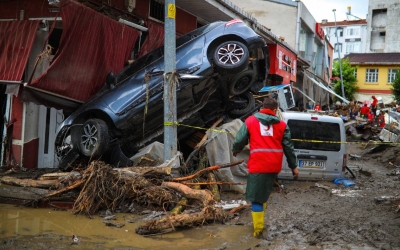COP26: Saudi Arabia and China resist climate deal over emissions data

Saudi Arabia and China have been accused of blocking progress at COP26 in Glasgow after refusing to agree to transparently report emissions, the Times reported on Tuesday.
Senior negotiators at the conference told the paper that the two countries had rejected the measure, which was proposed because of concerns about national governments not reporting the true extent of their carbon emissions.
Stay informed with MEE's newsletters
Sign up to get the latest alerts, insights and analysis, starting with Turkey Unpacked
Both countries are reportedly concerned that by sharing climate data they will disclose data about economic growth.
Saudi emissions are strongly connected to Saudi Aramco, the country’s biggest company and a global oil giant. Full transparency about the kingdom’s emissions would mean revealing information about the firm's economic performance.
Similarly, China has set climate targets based on a reduction in emissions per unit of GDP, which means that data about emissions would reveal wider details about the state of the national economy.
The reticence of the Saudi and Chinese delegations is reportedly keeping negotiators from advancing to other issues.
Both countries are also said to be resisting specific wording within text expressing the actions necessary to limit global warming to 1.5 degrees celsius. Neither wish to phase out their coal and oil consumption more quickly.
Former UK government scientific adviser Sir David King said at COP26 that the UN should have a system that could verify whether countries are fulfilling their promises and targets, the Times reported.
Middle East facing huge challenges
For many countries in the Middle East, the COP26 summit throws into stark relief the dichotomy at the heart of climate change: they are not chiefly responsible for the problem, but they will be badly affected by it.
Around 80 percent of greenhouse gas emissions are produced by the nations of the G20, of which only two, Saudi Arabia and Turkey, are from the region. But the burning of fossil fuels that has led to this catastrophe has created the wealth and prosperity of some of the region's most powerful players.

Extreme heat, drought, climate-driven migration, and widespread disruption to agricultural practices that often go back centuries are already a feature of daily life in the region.
Climate change has helped fuel civil war and conflict across the Middle East, including in Syria, Libya, and Yemen.
And yet vested economic interests and the urgent day-t0-day problems facing Middle Eastern societies mean that taking meaningful, long-term action on climate change is fraught with difficulty.
Moreover, those voices in favour of comprehensive action to cut fossil fuel emissions, such as environmental activists from the Global South, have been largely shut out of COP26 while billionaires such as Amazon's Jeff Bezos have flown in on private jets to grab the limelight.
Middle East Eye delivers independent and unrivalled coverage and analysis of the Middle East, North Africa and beyond. To learn more about republishing this content and the associated fees, please fill out this form. More about MEE can be found here.





